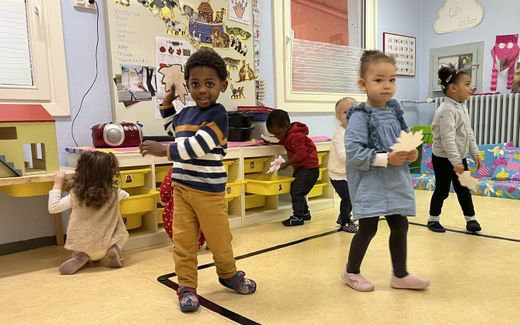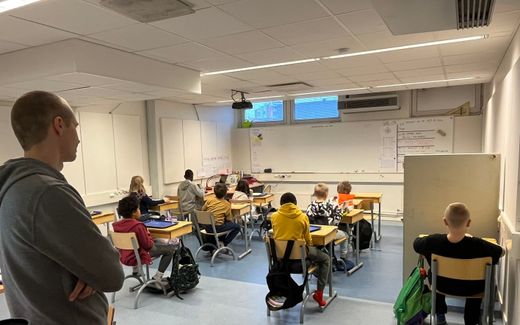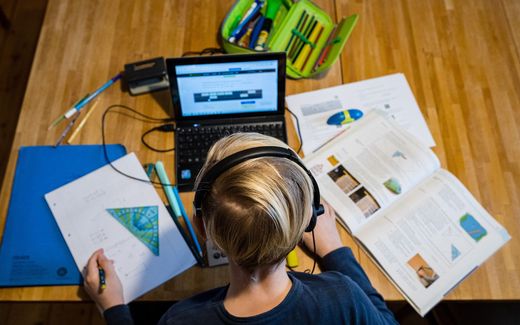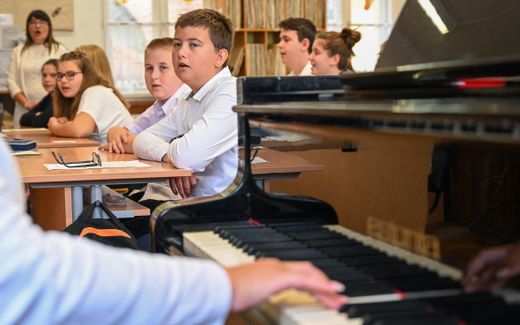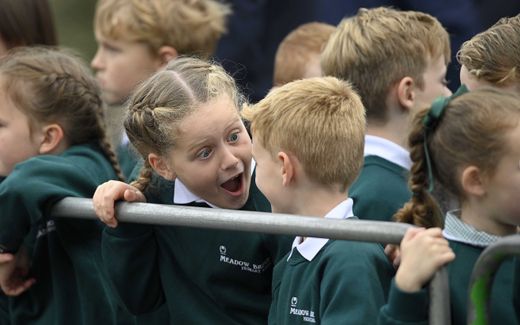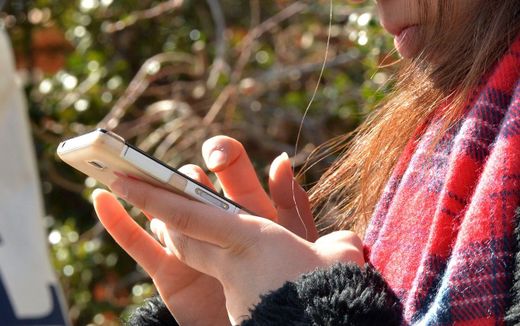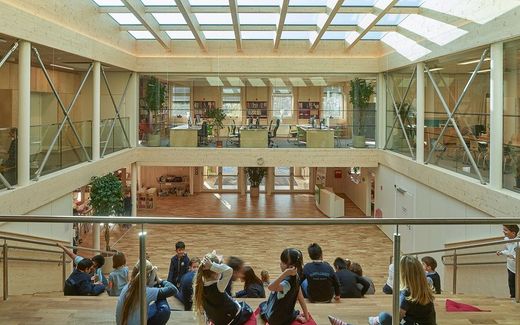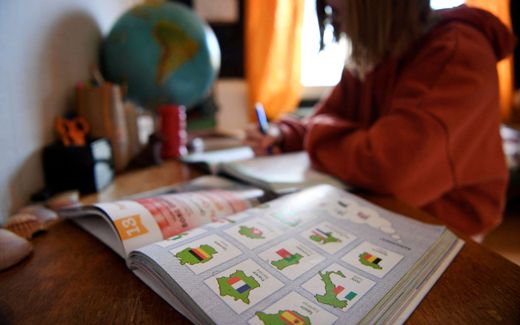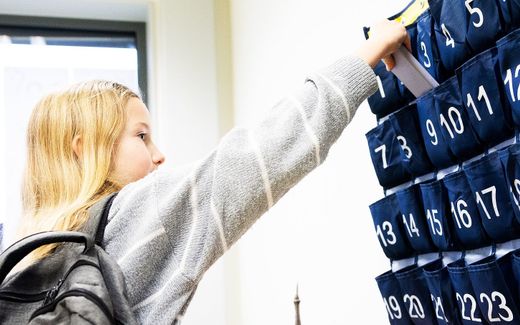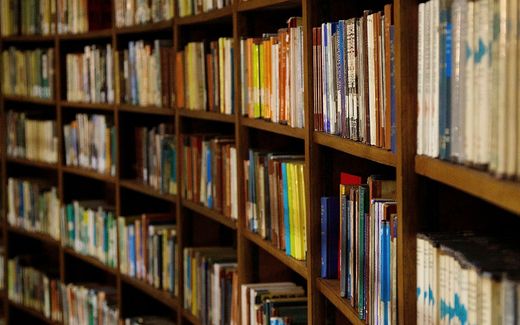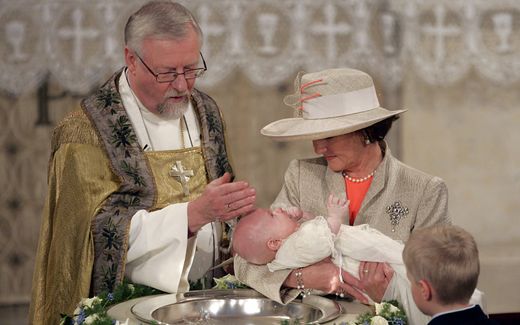Out of Paris's eyes: Christian schooling in France is a leap of faith
14-01-2025
Western Europe
Cornelis Boon (RD) & Evert van Vlastuin (CNE.news)
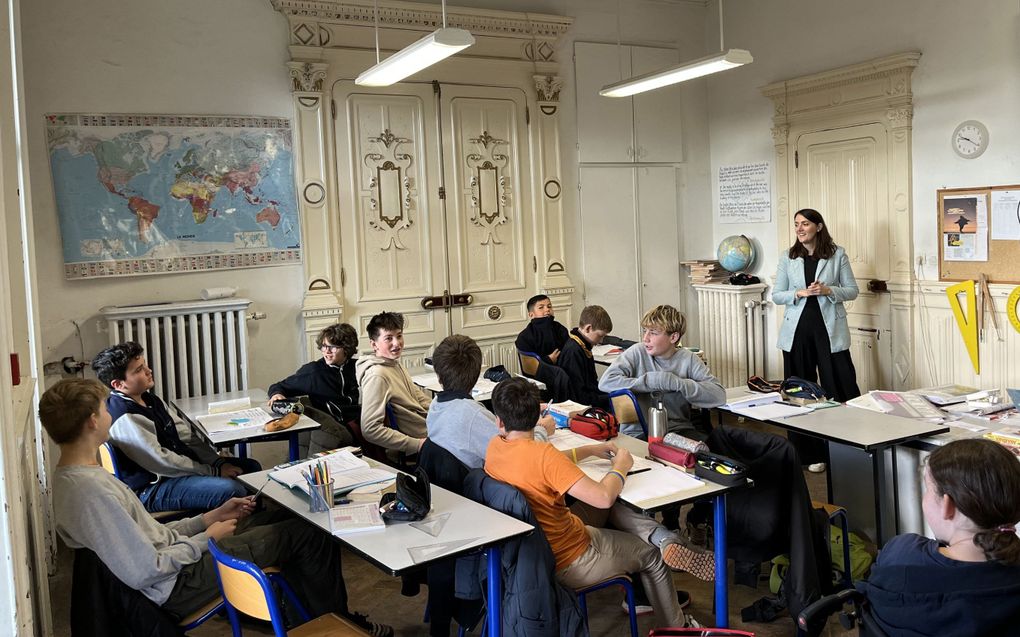
English class in Guebwiller. Photo CNE.news, Evert van Vlastuin
Western Europe
Few countries in Europe are so keen on controlling education as the French. But still, there are some hundreds of Christian schools active, of whom forty Evangelical. Completely private. “As long as there is an open door, we go forward.”
Jérome Garnier opens the Bible app on his mobile phone and reads a passage from Exodus. He shares some thoughts from this passage with his colleagues in the English classroom. After that, they collect prayer topics and bow their heads.
This is how the staff of the Christian school Établissement Daniel in the French Alsace start their working day. The furniture in this classroom is not fancy. The teachers still work with chalkboards and the paint is peeling off the window frames. But still, they are motivated to offer Christian education.

Établissement Daniel started in 1986. A few years later, the school bought this ‘chateau’, a castle-like villa from 1860 just outside Guebwiller; a town north of Mulhouse in the east of France.
When the teachers are praying, the pupils are gathering and start climbing the stairs. They wear school uniforms in different colours. Most of them come from the valley around Guebwiller, but some have to travel more than an hour to get to school. With 240 pupils, Établissement Daniel is one of the largest Christian schools in the whole of France, apart from a school on the outskirts of Paris.
Worldview
“Training in Christian worldview,” summarises director Patrick Schmitt the purpose of the school, while he serves coffee. “Evangelisation is not our main goal, although some pupils come to Christ here. Our purpose is to enhance the Christian mentality that seeks God’s glory on Monday as well as on Sunday.”
Schmitt himself came along in 1988 as a young teacher. He was still seeking for “God’s calling” in his life. “Then a girl said: Since I am in the school, I love life again. That convinced me.”
At the moment, the school welcomes the second generation. Schmitt’s own assistant and some teachers started at the school as pupils.
When Schmitt is talking, in the classrooms there is a 30-minute morning devotion. That consists of Bible reading, prayer and a discussion, from a teacher or student sharing something from his personal faith.
In the timetable there is room for Christian elements every week. In the high school classes, the school offers apologetics.
There is an informal part here, too. Schmitt: “Every teacher will in his or her own way clarify certain aspects of a topic with a Biblical perspective. This depends on the teacher. Traditionally, this is not done in Catholic schools. But we think it is important.”
Schmitt also finds subjects like national history wonderful when they are enlightened from a spiritual angle. “Take the Reformation and the Huguenots. Those have been very important for France. Let’s teach our students about that.”
John Calvin
During the centuries, Christian education always had a central place in France, Schmitt says. “Many schools are rooted in church institutions. Especially the Reformation in the 16th century brought an impetus of Christian education. It was a tool to keep the faith in the culture”, says the director. “I believe, secular education is quite a new invention.”
He refers to the French Reformer John Calvin, who said: “No church will flourish without a school.” That quote is posted at several places in the school together with an image of the reformer.
Later, the French state has gained more of a foothold in the education sector. Compulsory education applies from the age of 3 in France, “so that parents cannot ‘indoctrinate’ their children, one of our education ministers once said,” says Schmitt.
Partly for this reason, parents came together in the late eighties to start Établissement Daniel as an alternative. The pupil numbers grew to 150 just before 2000. At the moment, the school has reached a peak at 240 and that number is still increasing.
The children at the school come from 15-20 church denominations that range from Roman Catholic to Reformed, Schmitt estimates. But he does not precisely know, since the school does not ask for those details. Children of non-Christian parents also attend the school. Agreeing to the school’s principles –and for older pupils, a letter of motivation to go to the upper secondary school ("lycée")– is enough to be admitted to the school.
Établissement Daniel does not have a specific confession as foundation of the work. “We only work with the basic belief that is shared by all Christians, formulated by the Evangelical Alliance. Sometimes, you hear students debate about certain topics. That is fine. The idea is to mix youth from different churches and to bring unity in Christ’s body,” Schmitt argues.
Around the school, there is little debate about issues as creation versus evolution. Although some pastors in the spiritual neighbourhood of the school say, Genesis 1 is not historical. “We stick to the idea that all of the Bible is true and also historic, including the Genesis account. Although we are in contact with different visions.”
As part of the intake, the school always has an interview with new parents. “In that meeting, we present our faith and values. We ask them to respect that the school works from that background; that we read the Bible, pray, and present the Gospel. But also, when the parents do not agree with us in matters of faith, we cannot exclude any pupils. At the moment, 95 per cent of the children come from a Christian home.”
Exchange
The prayer meeting room has changed into a place for learning English. Ludmila Sartorisova, who is originally from Slovakia, has acted as the head English teacher for at least seven years.
When visitors –as the reporters for this feature– enter the classroom, all students stand up and greet us. They practice their English by asking questions to the journalists.
English is important for the school. Établissment Daniel has several exchange programs with Christian schools abroad in Finland (Espoo), Holland (Middelharnis) and Germany (Lahr). Schmitt also attends conferences of international education networks as ACSI, ECCEN, Eureca and the European Alliance for Christian Education (EACE).
Today, the school has visitors from Finland. The exchanges with the French school leads to baking Pulla –a traditional Finnish bread with lots of seeds on top– together. Among each other, the students communicate in English.
Anna is one of them. She enjoys the exchange. “Last year, we were in Finland ourselves”, she says enthusiastically.

She lives in Pfastatt, near Mulhouse. Her mother takes Anna, her two sisters and a brother to school by car; a 25-minute drive each way.
She likes it here at Daniel’s. “We talk about Jesus and every morning, we read from the Bible. That really fits with what we are used at home. When we have a common worship in the chapel, every second Monday, I play the guitar.”
Anna is 14 and is nearing high school. She could do that at Daniel but she prefers going to another high school, nearer to home.
EU integration

In another building, Jérome Garnier explains to a handful of high school teenagers the ins and outs of the European Union. The Parliament, Commission and Council are at the whiteboard, together with the names of its presidents. To the students, Garnier explains the different visions on EU integration.
Daniel started to build up the high school in the late nineties. High school in France ("lycée"). At the moment, 25 students are enrolled in this preparation for university.
Schmitt: “The pupils can only enter the high school if they are motivated for that. To check that, we ask them to write us a letter of motivation.”
Gestapo
Around the old school building, the space is open with the children are playing there. In the background, are the hills with vineyards.
At first, it seemed foolish to buy an old chateau for the school, Schmitt admits. “The maintenance has always been a challenge, although there is a group of volunteers to do the work. But look at the advantages too. The rooms in this building have the size of a classroom.”
During the Second World War, the house was claimed by the German Gestapo as their headquarters. After the war, the building was a place of Christian witness. “The Scripture Union sat here until the eighties. In a new-built house, there was a Christian orphanage. We thought that a school might be a proper purpose for the building.”

In a corner, a group of high school students enjoy their pause. Esther (15) came to Daniel three years ago. She was not a Christian at the time, she says. “But here, I started hearing the word of God and felt His presence. Through the school and the example of teachers and students, I learned to live with God as a friend.”
Also for Nina, the school was important in her personal walk with God. “I became a Christian when I was nine. I was still in the public school then. I asked my parents to switch to this school. It is important for me to pray together with my Christian friends here during the break.”
Finances
Christian education in France is a “work of faith”, Schmitt says. The state does not give subsidies and there are no large church denominations that support Établissement Daniel. Most of the money comes from the parents or private donations.
The salaries of teachers are not high: just the minimum wage of about 1500 Euros per month. Only after ten years, the school gives a small bonus. Still, while most schools struggle to get personnel, Daniel has more than enough reactions on vacancies.
From time to time, there are crisis moments, the director admits. “Then we fall on our knees”, he says. “It has always been a step in the faith. Every month, it is a blessing when we can pay the salaries. But then, it's time to pay the heating bills or something. We have to rely on God.”
Not only the teachers but also the parents are called to pray. “If there is a crisis, around 95 per cent of the parents participate. People are more keen to gather for praying.”
While public schools are free, private schools have to cover their own costs. In Guebwiller this means that parents pay 260 Euros per child per month. When more children from one family come to the school, it is cheaper, Schmitt says. “Most families pay around 200 Euros. We think, finances should not be a problem. We always try to help parents who cannot pay the full tuition fee.”
LGBT
Although the school is private, there is contact with the state through the inspection, that checks whether the school meets educational standards. Schmitt: “The inspector was astonished that we taught evolution as a theory, not as a proven fact. That was quite strange.”
The inspector did not raise the sensitive subject of sexual identity and LGBT rights. But in the past, the school has been in trouble about this regarding a former colleague.
Throughout France, the legal position of Christian schools can vary from region to region, Schmitt says. “Here in the Alsace, for instance, public schools can have religious classes. In other regions, that is not possible. But all over the country you see that the state claims control over education. All alternative forms, such as homeschooling, are difficult. The school is linked to the republic.”
The school believes that the state indeed has God-given tasks. Schmitt: “But we think, education is the primary responsibility of the parents.”
In France, the laicité tradition is that the state is quite strict in its demands. “Especially the left-wing parties stress that”, says Schmitt.
In the meantime, the society itself develops. In the year 2000, there were 100 private schools in the country. This number has sky-rocketed to 2000, varying from Roman Catholic to Jewish schools. “That shows that parents seek control, too.” The Fondation pour l’École represents the private schools at national level.
Schmitt reckons with the possibility that France will come to an even stricter policy. “We don’t know. But as long as the door is open, we go forward. On top of all governments, there is God.”
Therefore, Schmitt is full of plans with Établissement Daniel. One of his primary desires is to be of more help to smaller schools in the region “which have not the same blessings as we have” and struggle to survive. “At the moment, already 10 per cent of our money goes to other schools. We decided that thirty years ago, when we ourselves were in need of 80,000 Francs. We always have been blessed by this.”
Networks of private and Christian schools in France
Établissement Daniel belongs to a network of more than 40 Christian schools in France. Especially in the Paris area and along the river Rhône, there are comparable institutions. In the Alsace, there are six schools.
In France, the network organisation is Réseau Mathurin Cordier
The umbrella organisation of all French speaking evangelical schools is AESPEF. This organisation also works for schools in Belgium and Africa.
Related Articles

